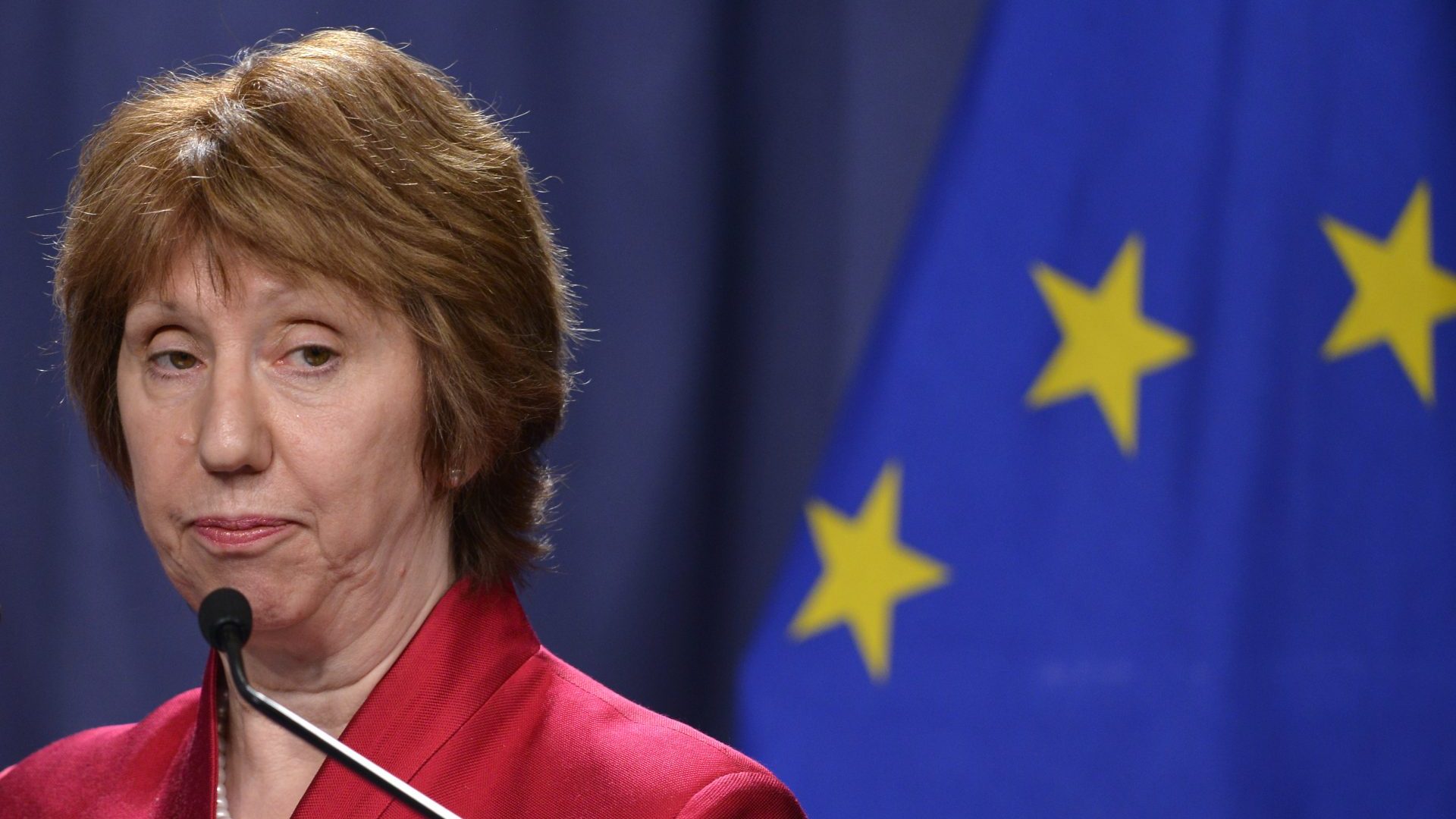When Catherine Ashton became the European Union’s top diplomat, she had to create an entire EU foreign office by herself. “Building the External Action Service was one line in the Lisbon treaty,” she says, when I meet her at her publisher’s offices in London on a bright winter morning. She quotes the line in question: “‘The high representative will be supported by an External Action Service’, full stop.” She had her work cut out.
Ashton had been Labour’s leader in the House of Lords when Gordon Brown was in No 10. She describes in her new book, And then What?, the moment in late 2008 when her career changed tack. In Westminster, the drivers tend to hear about reshuffles before the politicians, as the transport pool has to help with the changing security arrangements. So when Brown eventually called Ashton with the news, she knew what was coming, because her driver had already told her. “Can you get the next train to Brussels?” asked the prime minister, with typical Brownian directness. “You need to get there tonight.”
Her first position was EU trade commissioner, a job she held until 2009, when Brussels eventually created the External Action Service. Shortly afterwards, she became the European Union’s first-ever high representative for foreign affairs, and as she points out in this unusually compelling book, she was the first and last Brit to hold that role.
Building the service itself was a huge effort. “That required moving thousands of people, against a really challenging economic backdrop,” says Ashton. At the time, the global financial crash was beginning to bite and the euro crisis was gathering momentum. “It was also against the backdrop of every member state, the commission and the parliament having different expectations.
“While I was building a service, I was choosing the furniture. I designed the food court in the new building. I wanted a food court and made sure anyone who worked in our institution could come in for lunch. It was a way of getting people to come into the building. It apparently won an award. They didn’t give it to me, quite rightly.”
Ashton, who is from Upholland in Lancashire, wears her experience, and her former seniority, lightly. Softly spoken, she retains an ironic sense of humour, and laughs when I ask whether they named the food court after her. But there is a serious point beneath all this. Diplomacy is about negotiation, and negotiation is the pursuit and discussion of fine detail. As this book makes clear, Ashton is well suited to that task.
In her role as the EU’s foreign secretary, Ashton was involved in some of the most significant international negotiations of recent decades, including talks with Iran over its nuclear programme and with Russia after its 2014 invasion of Crimea. Those negotiations involved the scrupulous interrogation of detail. And yet, not all politicians take that approach. Others opt instead for a more blasé attitude to international relations. Take, for example, Boris Johnson’s decision to sign a deal with the EU without fully grasping its detail – that is what diplomatic failure looks like.
“Diplomacy and foreign policy are not in the big grand statements,” says Ashton. “This book is meant to show people what diplomacy looks like, and what it looks like for real.”
“Something people don’t necessarily think of is that when the European meetings happen, you’ve got 23 languages and it has to work in all of them,” she says. “Often when you are trying to find a phrase or a word that is going to manage a series of positions, in English you choose a particular word and then you discover it doesn’t work in another language because it doesn’t mean the same thing – or it doesn’t exist.”
That complication became a particular challenge during the Iran negotiations, where the agreement had to be presented in Russian, Mandarin Chinese, French and German. “And you’ve got American and British English – don’t forget there are differences in how those work.”
Ashton’s account of the Iran negotiations describes the gruelling work that goes into a deal of this kind. Having nailed down the first 95% of the agreement, the conversation got stuck on the remaining 5%. “Each session lasted over three hours,” she writes. “In one sentence, the phrase ‘in practice’ was used to indicate that if a solution was agreed, it would ‘in practice’ involve an enrichment programme. Iran thought it might render conditional the point that they were entitled (in their view) to such a programme. I discussed with the Americans and Europeans whether we could use ‘in reality’, ‘in exercise’, ‘in operation’, ‘effectively’ and so on.”
The Iran deal was an extraordinary act of diplomatic heavy lifting, and one that eventually succeeded – as did Ashton’s orchestration of dialogue between Serbia and Kosovo when tensions rose over their shared border. Ashton was also involved in the suppression of Somali pirate activity off the east coast of Africa and, in 2013, trying to find a settlement in Egypt after the ousting and detention of the president, Mohamed Morsi.
One of the most remarkable – and darkly comic – moments in her book is Ashton’s description of being taken by the Egyptian army to visit Morsi, who was being held in a top-secret black site. The precautions taken to hide the deposed president’s location were elaborate and Ashton was not allowed to know where she was being taken. Eventually, when she stepped out of the helicopter at the final destination, she was confronted by a huge sign reading: “ALEXANDRIA”.
It is a compelling and engaging book – but it is hard to look at the current global situation without feeling that international diplomacy has somehow failed. “I do think there are things we have got to get better at, for example we have got to think much longer term,” says Ashton. “Crises and problems rarely erupt suddenly. They may appear on the horizon suddenly, but they have bubbled up for many years, sometimes decades.”
In the course of the Iran negotiations, the Russians played a constructive role, and Sergey Lavrov, the foreign minister, developed a habit of breaking moments of tension by producing bottles of champagne from under the table. Reading those passages now, it is troubling to consider how completely and how quickly relations with Russia have collapsed. No European diplomat would drink champagne with Lavrov now.
“There was an absolute understanding that Russia could become very dangerous,” Ashton says. “It did not spend its time making friends. Its attitude to the Baltic states was wholly negative, quite antagonistic. We were not under any false illusions about it.”
The EU was working with Russia on the Iran deal when, in 2014, Putin sent his army into Crimea. “It raises the question I don’t try to address in the book, which is: do you rip everything up, in terms of your dialogue, when you have a conflict? Or do you try and carry on?”
Ashton’s assessment is that once Putin invaded in 2014, there was no incentive for Russia to move out of Ukraine. “It had done what it had done in Georgia,” she says, “which was to create a circumstance where the country is not whole, where it can’t operate as a sovereign state, it can’t join anything, and that may well have continued like that for a long period of time.”
“We weren’t perhaps doing as much as we should have to try and find a way through that. You’re still going to need diplomacy, because you are still going to need to find answers to questions, and have some point where people sit down and work out what happens.”
And in her view, could diplomacy have ever averted the Russian war in Ukraine? “It’s a really good question,” she says, “but I don’t know.”
In amongst all this is the person of Ashton herself and the ambiguous position she occupied throughout these negotiations – and throughout her career at the EU. She was a senior diplomat, the equivalent of a foreign secretary, and she played a more central role in negotiations than many national foreign ministers. But at the same time she represented no country. Her only affiliation was with a transnational institution made up of a collection of states. So, who did she feel she represented?
“I represented the EU,” she says, very straightforwardly. Seeing her role in that way allowed her to give “a demonstration of what Europe could do that member states on their own couldn’t do – to show what EU foreign policy could do that was different.”
The role of the EU, in her view, will only increase in significance, particularly now that the international problems confronting world leaders are so acute, including the war in Ukraine, the rise of China, the spike in global inflation and the effects of climate change. When considered alongside China and the US, I ask, does she see the EU as making up a third pillar of global power? “I remember a Indian minister saying to me, ‘it’s a multipolar world, Cathy, we’re just not sure Europe wants to be a pole!’” It’s a clever, witty, but evasive response.
Even so, Ashton says, the EU’s economic significance is “bigger than it recognises, sometimes”. As for the Russians, and their attitude towards the EU, “they just think it’s a temporary construct,” she says. “They don’t want it to be real – that’s how I felt about Russia’s attitude to the EU. They wanted it to be something they could ignore.” That attitude is, sadly, also prevalent among British Eurosceptics.
I point out that the book doesn’t mention Brexit. “No. And I very deliberately didn’t, because these are foreign policy stories.” It’s an interesting remark, as again it raises the question of what is and is not “foreign” policy, particularly from the perspective of a multinational organisation like the EU. Seen from Britain, Brexit most certainly feels like a foreign policy issue.
“In the future, no matter what happens, Britain will need a strong relationship of sorts with Europe,” she says. That much is uncontroversial. But her suggestion that “from the American perspective, they want to see Britain having a relationship with Europe,” suggests a view of Britain’s place in the world that the Brexiteers who run Britain would find less attractive.
Towards the end of the book, she dwells on the fact she will be the “last” Brit to be the EU’s top diplomat. But is that “last” as in final, or as in most recent? If it is the former, it implies we won’t rejoin; if the latter, she leaves that possibility open. After the long passages describing her wrangling over the precise interpretation of words, it is quite possible that the double meaning is intentional. But Catherine Ashton has done her share of heavy lifting – perhaps that’s one ambiguity we can pass over in silence.











